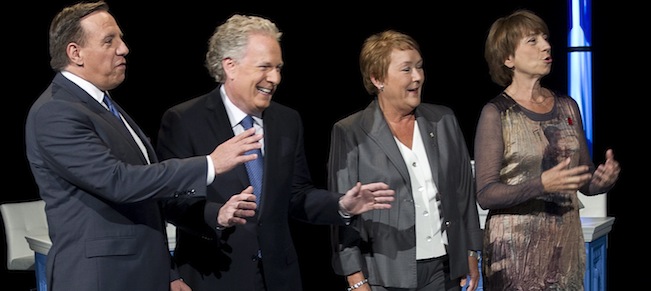Opinion: After PQ victory, Quebec more divided than ever
The PQ didn’t win because it ran the best campaign. It won because it benefitted outrageously from the distortions of our electoral system
Share
 Politically and ideologically, post-election Quebec is more divided than ever before.
Politically and ideologically, post-election Quebec is more divided than ever before.
More than two out of three Quebecers who voted did not support the Parti Québécois.
The PQ didn’t win because it ran the best campaign, or because it deserved to win. It won because it benefitted outrageously from the distortions of our electoral system.
With 31.9 per cent of the popular vote, the PQ performed worse than in 2008 when it won 51 seats with 35.1 per cent support. The decline of the Liberal vote — inevitable after nine years in power — coupled with the emergence of a relatively strong third party (the CAQ) allowed many PQ candidates to win by fewer than a thousand votes.
If the PQ didn’t win resoundingly, it has no one to blame but itself.
Let there be no doubt: During this campaign, Pauline Marois spoke too much to her own supporters, and not enough to all Quebecers.
Mandatory French instruction in CEGEP, citizenship based on language, a charter to ensure secularism—the list was designed to please the PQ base. Pierre Trudeau once famously stated that the state has no place in the bedrooms of the nation. Under the PQ government, it will be in the bedroom and the kitchen and the living room and wherever individuals choose to live their private lives.
The PQ didn’t win because it demonstrated economic competence. Former PQ Minister Joseph Facal wrote the day before the vote that the PQ economic propositions were “populist, unrealistic and designed to appeal to traditional Québec Solidaire (QS) voters.” He added that the PQ approach on public finance was “completely out of date.” It doesn’t matter that Québec’s debt GDP ratio is at 55 per cent and keeps going up. For the PQ, it’s business as usual. The wealthy will pay.
Even on selling independence, the PQ came up short. It has never been so difficult for it to articulate a rational, coherent and unifying project for a new country. Instead, Marois spent days muddling into the procedural aspects of a future referendum on secession and distanced herself from a party proposal that would allow for 15 per cent of voters to initiate one. The substance of the idea of independence was never discussed. As a consequence, Françoise David and Jean-Marc Aussant, leaders of Québec Solidaire and Option Nationale, became more credible spokesmen for secessionists than Pauline Marois.
In the end, Jean Charest lost his bet, but not by much. Only four seats and 0.7 per cent of the vote separated the PLQ and the PQ. He thought the student strike would provide him a wedge on law and order. The students decided otherwise. They went back to class. The odds were never on his side: no party has ever been elected four times consecutively in Quebec’s history.
François Legault didn’t do too badly. He was able to press many of his campaign themes and convinced many Quebecers it was time to get rid of the “old” parties. But he fell short of selling Quebecers the kind of changes he believed were in their best interest. His populism resonated with some voters – but many were turned off by his simplistic solutions to structural problems in Quebec politics.
In the rest of Canada, many tend to perceive Quebec as a monolithic political community. After Tuesday night, that characterization has never been farther from the truth.
Robert Asselin is the associate director of the Graduate School of Public and International Affairs at The University of Ottawa. He previously served as an adviser and speechwriter to the Prime Minister of Canada and to the Leader of the Official Opposition.